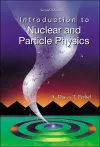
Introduction To Nuclear And Particle Physics (2nd Edition)
2 authors - Paperback
£56.00
An award-winning urbanist, Dr. Bharat Dahiya combines research, policy analysis and development practice aimed at examining and tackling socio-economic, environmental and governance issues in the global urban context. Since early-1990s, Bharat’s research and professional work has focused on sustainable cities and urbanization, strategic urban planning and development, sustainable and inclusive cities, urban environment and resilience, and urban governance. Working with the World Bank, UN-Habitat, the Asian Development Bank, United Nations University Institute for the Advanced Study of Sustainability (UNU-IAS), and UNDP, he provided policy advice and technical support to national and local governments. Moreover, working with these international agencies, he initiated, led and contributed to international projects on sustainable urban development in the Asia-Pacific region.
Whilst working on operational projects on sustainable urban development, Bharat contributed to knowledge generation, especially through meta research and review of policies, programmes and projects. At the World Bank headquarters, he conducted the first-ever systematic review of the Bank’s investments for improving urban liveability, published as a co-authored book, Urban Environment and Infrastructure: Toward Livable Cities (World Bank, 2004; ISBN 978-0821357965). he conceptualized and coordinated the preparation of United Nations’ first-ever report on The State of Asian Cities 2010/11 (UN-Habitat and UN-ESCAP, 2010; ISBN 978-9211322743). More recently, he co-authored Partnering for Sustainable Development: Guidelines for Multi-stakeholder Partnerships to Implement the 2030 Agenda in Asia and the Pacific (UNU-IAS and UN-ESCAP, 2018; ISBN 978-92-808-4585-3). Bharat is co-editor of New Urban Agenda for Asia-Pacific: Governance for Sustainable and Inclusive Cities (forthcoming, Springer).
Bharat serves on the editorial boards of Cities: The International Journal of Urban Policy and Planning, Journal of Urban Culture Research, Jindal Journal of Public Policy, and National Geographical Journal of India. He has held academic positions in Australia, Indonesia and Thailand. Reuters, Inter Press Service, SciDev.Net, Nishi-Nippon, The Korean Economic Daily, China Daily and its Asia Weekly, The Hindu, Deccan Herald, Bangkok Post, The Nation, UB Post, The Sunday Times, and Urban Gateway have quoted his work. Bharat is based at the College of Interdisciplinary Studies, Thammasat University, Bangkok. He holds a PhD in Urban Governance, Planning and Environment from the University of Cambridge, United Kingdom.
Dr. Ashok Das is an Associate Professor in the Department of Urban and Regional Planning, University of Hawai‘i at Mānoa (UHM), USA. He is also an affiliate faculty of UHM’s Center for Southeast Asian Studies, and Center for South Asian Studies. He was co-chair (21016-18) of the Association of Collegiate Schools of Planning’s (ACSP) Global Planning Educators Interest Group (GPEIG). He received his Ph.D. in Urban Planning from the University of California, Los Angeles (UCLA); M.Arch. and M.A. in Environmental Planning & Management from Kansas State University; and B. Arch. from the School of Planning and Architecture, New Delhi. Previously, he was an assistant professor in the San Francisco State University’s Department of Urban Studies and Planning; architecture and planning consultant in the United States and India; and the chief cartoonist for Architecture+Design, India’s leading architecture magazine. Ashok researches institutional challenges and innovations for ameliorating urban poverty through services provision in Asia-Pacific, particularly in Indonesia and India, and affordable housing in the US. Community participation and empowerment, slum upgrading, decentralization and governance, civil society, community-managed integrated microfinance, disaster risk reduction, inclusionary zoning, and planning education are specific research interests. The Ford Foundation, the World Resources Institute, and the Office of Hawaiian Affairs have sought his advisory services.